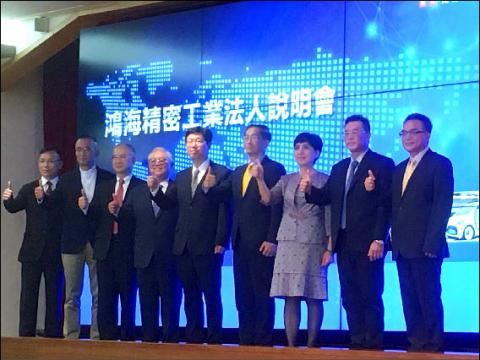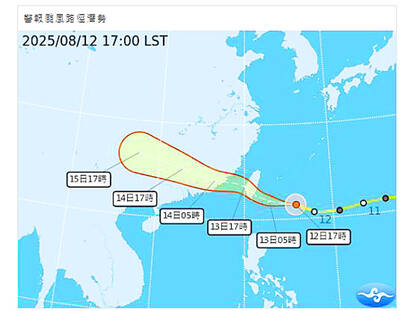Hon Hai Precision Industry Co (鴻海精密) yesterday established an operations committee to take charge of its daily operations, amid rising concern over the company’s fate as chairman Terry Gou (郭台銘) ventures into politics.
The nine-member committee is to meet once a week and present its decisions directly to Hon Hai’s board of directors for approval, making it the second most important decisionmaking unit of the company, Young Liu (劉揚偉), a nominee for board director, said at the company’s first-ever investors’ conference.
Any proposal made by a committee member needs to gain approval from at least two-thirds of the committee before being submitted to the board for approval, he said.

Photo: Chen Jo-chen, Taipei Times
Other committee members include financial director Huang De-cai (黃德財), and three board nominees — Lu Fang-ming (呂芳銘), Li Jie (李傑) and Lu Sung-ching (盧松青).
Hon Hai vice president and group chief financial officer Huang Chiu-lien (黃秋蓮), Sharp Corp board director candidate Lin Chung-cheng (林忠正), Hon Hai digital product sub-group chief Chiang Chih-hsiung (姜志雄) and China iPhone business head Lin Cheng-hui (林政輝) round out the list.
The board nominees sought to reassure investors as the company’s stock has plummeted more than 20 percent amid concerns over Gou’s imminent departure after he joined the Chinese Nationalist Party’s (KMT) presidential primary.
Faced with an escalating US-China trade dispute, Liu said the current market is volatile, and US President Donald Trump’s administration’s unpredictability is adding to the uncertainty.
With production sites in 16 countries, Hon Hai has not taken a big hit from the dispute as it is able to reallocate orders, Liu said, citing last month’s record-setting revenue of NT$384.22 billion (US$12.22 billion) as proof.
“About 25 percent of overall production comes from other countries besides China,” Liu said, adding that the company has the ability to rapidly increase production in those countries depending on the demand of clients, such as Apple Inc.
Hon Hai is able to predict and adapt to a fast-changing environment, such as its decision to invest in Wisconsin before the US-China trade dispute broke out, he said.
“We have also built a production site in Chengdu [China] to make iPads within 90 days,” he added.
Hon Hai is now focused on deploying technologies, such as industrial Internet of Things (IoT), across its plants to digitally transform the firm and improve profitability, Li said.
“We will use AI [artificial intelligence], big data, cloud and domain knowledge,” Li said.
The company’s sheer scale represents a micro cosmos, allowing it to build up a system that deploys cutting-edge technologies, he said.
Asked about the company’s plan to raise employee pay by 7 percent and cost concerns, Huang said that it is an incentive to attract talent and the company cannot afford to reduce investment in research and development in order to stay globally competitive.
The company said that it would hold an investors’ conference every six months.
It is scheduled to hold its annual shareholders’ meeting on Friday next week to approve new board members, among other things.

DEFENSE: The first set of three NASAMS that were previously purchased is expected to be delivered by the end of this year and deployed near the capital, sources said Taiwan plans to procure 28 more sets of M-142 High Mobility Artillery Rocket Systems (HIMARS), as well as nine additional sets of National Advanced Surface-to-Air Missile Systems (NASAMS), military sources said yesterday. Taiwan had previously purchased 29 HIMARS launchers from the US and received the first 11 last year. Once the planned purchases are completed and delivered, Taiwan would have 57 sets of HIMARS. The army has also increased the number of MGM-140 Army Tactical Missile Systems (ATACMS) purchased from 64 to 84, the sources added. Each HIMARS launch pod can carry six Guided Multiple Launch Rocket Systems, capable of

GET TO SAFETY: Authorities were scrambling to evacuate nearly 700 people in Hualien County to prepare for overflow from a natural dam formed by a previous typhoon Typhoon Podul yesterday intensified and accelerated as it neared Taiwan, with the impact expected to be felt overnight, the Central Weather Administration (CWA) said, while the Directorate-General of Personnel Administration announced that schools and government offices in most areas of southern and eastern Taiwan would be closed today. The affected regions are Tainan, Kaohsiung and Chiayi City, and Yunlin, Chiayi, Pingtung, Hualien and Taitung counties, as well as the outlying Penghu County. As of 10pm last night, the storm was about 370km east-southeast of Taitung County, moving west-northwest at 27kph, CWA data showed. With a radius of 120km, Podul is carrying maximum sustained

Tropical Storm Podul strengthened into a typhoon at 8pm yesterday, the Central Weather Administration (CWA) said, with a sea warning to be issued late last night or early this morning. As of 8pm, the typhoon was 1,020km east of Oluanpi (鵝鑾鼻), Taiwan’s southernmost tip, moving west at 23kph. The storm carried maximum sustained winds of 119kph and gusts reaching 155kph, the CWA said. Based on the tropical storm’s trajectory, a land warning could be issued any time from midday today, it added. CWA forecaster Chang Chun-yao (張竣堯) said Podul is a fast-moving storm that is forecast to bring its heaviest rainfall and strongest

TRAJECTORY: The severe tropical storm is predicted to be closest to Taiwan on Wednesday and Thursday, and would influence the nation to varying degrees, a forecaster said The Central Weather Administration (CWA) yesterday said it would likely issue a sea warning for Tropical Storm Podul tomorrow morning and a land warning that evening at the earliest. CWA forecaster Lin Ting-yi (林定宜) said the severe tropical storm is predicted to be closest to Taiwan on Wednesday and Thursday. As of 2pm yesterday, the storm was moving west at 21kph and packing sustained winds of 108kph and gusts of up to 136.8kph, the CWA said. Lin said that the tropical storm was about 1,710km east of Oluanpi (鵝鑾鼻), Taiwan’s southernmost tip, with two possible trajectories over the next one